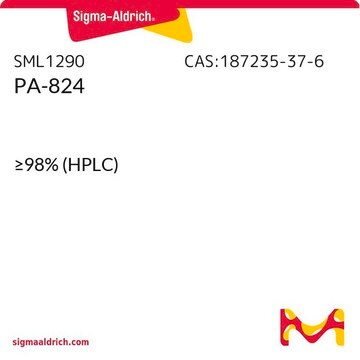SML4007
TMC207

≥98% (HPLC)
Sinónimos:
(αS,βR)-6-Bromo-α-[2-(dimethylamino)ethyl]-2-methoxy-α-1-naphthalenyl-β-phenyl-3-quinolineethanol, (1R, 2S)-1-(6-Bromo-2methoxy-3-quinolinyl)-4-(dimethylamino)-2-(1-naphthalenyl)-1-phenyl-2-butanol, Bedaquiline, R 207910, R-207910, R207910
About This Item
Productos recomendados
Quality Level
assay
≥98% (HPLC)
form
powder
optical activity
[α]/D 195.0 to 155.0° (c = 0.5g/100mL in DMF)
color
white to beige
solubility
DMSO: 2 mg/mL, clear
storage temp.
-10 to -25°C
SMILES string
BrC(C=C1)=CC2=C1N=C(OC)C([C@@H](C3=CC=CC=C3)[C@](O)(C4=CC=CC5=C4C=CC=C5)CCN(C)C)=C2
Biochem/physiol Actions
TMC207 (Bedaquiline; R207910) is an orally active, potent and selective mycobacterial ATP synthase inhibitor (M. smegmatis IC50 = 2.5 nM or 1.4 ng (non-salt form)/mL; human mitochondrial ATP syntase IC50 >200 uM) with broad-spectrum anti-mycobacterial activity (MIC 10-120 ng/mL), including M. bovis, avium complex (MAC), kansasii, marinum, fortuitum, abscessus, smegmatis, ulcerans, and both drug-susceptible and multiple drug-resistant M. tuberculosis strains (to rigampin, isoniazid, streptomycin, ethambutol, pyrazinamide, fluoroquinolone).
signalword
Warning
hcodes
pcodes
Hazard Classifications
Aquatic Chronic 1
Storage Class
11 - Combustible Solids
wgk_germany
WGK 3
flash_point_f
Not applicable
flash_point_c
Not applicable
Certificados de análisis (COA)
Busque Certificados de análisis (COA) introduciendo el número de lote del producto. Los números de lote se encuentran en la etiqueta del producto después de las palabras «Lot» o «Batch»
¿Ya tiene este producto?
Encuentre la documentación para los productos que ha comprado recientemente en la Biblioteca de documentos.
Nuestro equipo de científicos tiene experiencia en todas las áreas de investigación: Ciencias de la vida, Ciencia de los materiales, Síntesis química, Cromatografía, Analítica y muchas otras.
Póngase en contacto con el Servicio técnico







